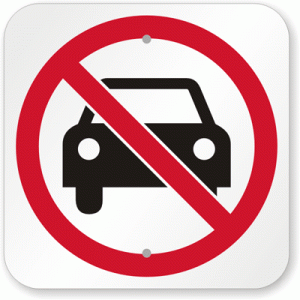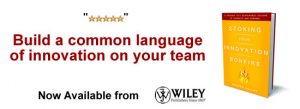7 Days Sans Voiture for Innovation
 One of the activities I undertake to force my brain to step outside of any regular patterns is to listen to an internet stream of an all-news French radio station, known as FranceInfo. I lived in Aix-en-Provence, France, in 1991 and FranceInfo was my favorite local station. I recently heard an interview with a French government official discussing an upcoming “jour sans voiture†on a Sunday in Paris across a large portion of the city. Cars would be banned from huge parts of the city and citizens would have to rely on public transportation, biking, or walking to get from place to place. The official was talking excitedly about the lack of pollution and reduction in noise that he expected on that day and the freedom that pedestrians and bicyclists would feel not having to worry about being run over by a car.
One of the activities I undertake to force my brain to step outside of any regular patterns is to listen to an internet stream of an all-news French radio station, known as FranceInfo. I lived in Aix-en-Provence, France, in 1991 and FranceInfo was my favorite local station. I recently heard an interview with a French government official discussing an upcoming “jour sans voiture†on a Sunday in Paris across a large portion of the city. Cars would be banned from huge parts of the city and citizens would have to rely on public transportation, biking, or walking to get from place to place. The official was talking excitedly about the lack of pollution and reduction in noise that he expected on that day and the freedom that pedestrians and bicyclists would feel not having to worry about being run over by a car.
I did further research and found that the City of Paris has challenged its citizens to abandon their cars from September 19th through the 25th (“une semaine sans voitureâ€). The City of Paris would provide free access to public transport and bikes for anyone taking this challenge. Although we in America profess to have a love affair with the automobile, the French are perhaps even more attached to their cars, so this program is indeed a major step for its residents.
The objectives of the week without cars are as follows:
(1) Teach Parisians that single-occupancy vehicles can be replaced with other forms of transports for the majority of daily trips
(2) Begin a movement that will progressively reduce the use of single-occupancy vehicles
(3) Analyze the results of the 7 days to see what the effects are on pollution reduction and assess any problems that people have with finding alternative transportation so those problems can be addressed in future political discussions
As I thought about this program from an innovation standpoint, it struck me that something like this would be useful for the innovation practitioner. Think about a Parisian who is used to getting into a car 7 days a week for work and other activities. The scenery in commuting to work is largely the same: same roads, same traffic jams, same fight for parking, same noise, same stress. The scenery for other trips is largely the same as well: same shops, stores, restaurants, gyms, etc. Breaking this bind with the car would immediately and fundamentally alter all of these previous patterns. One would wake up earlier, plot a walking path to the nearest public transit, notice different things in the neighborhood that one would not notice from a car. Smells, sounds, temperatures, and numerous other sensations would be quite different from one’s normal behavior patterns. One would go to different shops, perhaps the closest neighborhood grocery store rather than the larger store that is easier to get to in the car.
I have to believe that these new sets of experiences would open one up to fresh thinking about whatever problem one is trying to solve and that this new thinking would be beneficial to the innovation practitioner.
Although an innovator could try to follow the French model and leave one’s car behind for a week, other accouterments of daily life or work life could be abandoned for a similar period of time to stimulate these new thoughts. One could put away a cell phone for a week (I know many are shuddering at the very thought of that). One could also shut down email for a week, or not do any conference calls. Rather than sending an email, perhaps walking down the hall to speak to a colleague might result in a conversation that solves a problem. There could be dozens of things that one encounters on a daily basis that could be replaced for a week with something quite different to free one’s mind from the constraints that we find ourselves in on a daily basis. Think of something you do every day the same way and do it differently. Instead of drinking coffee try tea. Instead of taking a break at the coffee shop go somewhere new. Try a different restaurant for lunch. Go for a walk in a different direction than normal. Stepping outside one’s boundaries and forcing a change in one’s patterns could be a good source of new thinking and innovation.
Sources:
https://www.paris.fr/actualites/une-semaine-sans-voiture-cap-ou-pas-cap-3946
https://www.google.com/amp/amp.lepoint.fr/2062233
Wait! Before you go…
Choose how you want the latest innovation content delivered to you:
- Daily — RSS Feed — Email — Twitter — Facebook — Linkedin Today
- Weekly — Email Newsletter — Free Magazine — Linkedin Group
 Scott Bowden is an independent innovation analyst. Scott previously worked for IBM Global Services and Independent Research and Information Services Corporation. Scott has PhD in Government/International Relations from Georgetown University.
Scott Bowden is an independent innovation analyst. Scott previously worked for IBM Global Services and Independent Research and Information Services Corporation. Scott has PhD in Government/International Relations from Georgetown University.
NEVER MISS ANOTHER NEWSLETTER!
LATEST BLOGS
How Small is Too Small?
When it comes to a hotel room, how small is too small. There are several new entrants into the hotel…
Read MoreMost Successful Loser in History
I came across an interesting branding article on a BusinessWeek blog the other day about Al Gore, and I have…
Read More



